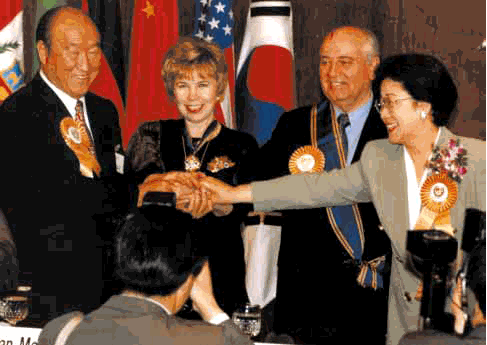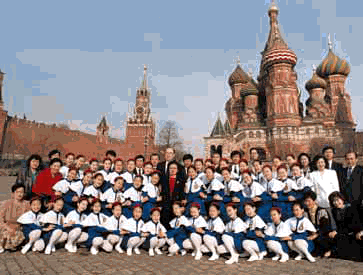
40 Years in America

|
|
40 Years in America |
|
The Moscow Rally

Rev. and Mrs. Moon meeting with President and Mrs. Gorbachev
All of these events and projects were steps in Rev. Moonís march to Moscow. They culminated in the eleventh World Media Conference held in Moscow, April 10-13, 1990, under the joint sponsorship of the World Media Association and Novosti Press Agency. The theme of the conference, appropriately, was "The Global Implications of Glasnost and Perestroika." The Summit Council for World Peace and the AULA held their annual conferences concurrently in Moscow. Together, these three conferences and the events surrounding the meetings constituted the "Moscow Rally" which Unification Church members, particularly those in America, had so eagerly anticipated. The centerpiece of the rally was Rev. Moonís plenary address delivered before the combined assemblies, some 600 invited journalists from the WMC and forty-one former heads of state. In addition, there were a large number of working news personnel covering the speech (more than 600 Soviet and foreign news reporters requested credentials). Had Rev. Moon limited his speech to innocuous and gratuitous founderís remarks, itís doubtful that the event legitimately could have been considered a rally. After all, there were few church members on hand, and the format otherwise was that of an academic or professional meeting.
However, Rev. Moonís speech was "direct and strong." According to Dr. Bo Hi Pak, Rev. Moon covered the gamut of his religious teaching in 45 minutes. In Dr. Pakís words, "they got the whole message, lock, stock and barrel." A non-church journalist commented that he "had lectured the Soviet people on Adam and Eve. If this...did not cap the new era, one wonders what would." Rev. Moonís directness raised the issue of "how well [his remarks]...would be received in the headquarters city of worldwide atheism." Dr. Pak, who translated, said,
I was the one who was sweating next to [him]...because his words were so strong. I looked around at this Russian face, that Russian face. I was worried they might stand up and walk out, which sometimes happens in the United Nations when an ambassador disagrees with someone.
Dr. Pak need not have worried. Rev. Moon had read the signs of the times and constructed his foundation well. He already had been feted in the presidential VIP room at the Moscow airport, given a national television interview, driven in from the airport with a police escort and in traffic lanes usually reserved only for the president, and housed in the Central Committeeís hotel reserved for the highest communist officials. Clearly, the Soviets were as interested as he was in the success of the meeting. Although one memberís comment that the Soviets "drank up" Rev. Moonís speech "like thirsty spirits at the spring of life" was something of an overstatement, the Russian press covered the entire meeting, including Rev. Moonís address, positively. The following speaker, Albert Vlashov, chairman of the Novosti Press Agency, simply said, "the Rev. Moon has really crossed a long way to come to the Soviet Union, and not only miles." Conference organizers learned by late afternoon on the day of the address that President Gorbachev had given his approval for a meeting with Rev. Moon. Larry Moffit, who helped organize the media gathering, noted, the "maximum victory" for the Moscow event "was defined early on as a cordial meeting between...[Rev. Moon] and Gorbachev." In fact, expectations had risen to the point that a failure to secure such an invitation would have been interpreted as a providential setback. Thus organizers breathed a collective sigh of relief when Rev. and Mrs. Moon along with twenty-eight former presidents or prime ministers and several assistants entered the Kremlin at 4:30 p.m. on April 11, 1990 and were seated.
The details of the session as worked out with Gorbachevís staff was that there would be an initial meeting of an undetermined length with all present, to be followed by a private meeting between the President, Rev. and Mrs. Moon, one ambassador and a couple of senior staff. During the open meeting, Gorbachev spoke and listened for an hour and a half. He welcomed "the presidents of various nations" and "especially Rev. and Mrs. Moon." He commented that their conference was "very important" and expressed satisfaction that it had been "very successful so far." Rev. Moon thanked him for the opportunity to come to Moscow, explained that all former heads of state at the table were supporting him, and urged him to consider the World Media Conference his "asset." Dr. Bo Hi Pak, who attended the half-hour private meeting in Gorbachevís personal office, reported that the President was "completely free, embracing and talkative."
According to the Seoul-based and movement-funded Seyge Ilbo newspaper, Mr. Gorbachev "strongly hinted at the possibility of establishing the state relationship" between the USSR and South Korea "within the year" and expressed his "willingness to act as a mediator" in North and South Korea reunification talks. The Segye Ilbo, reported that Gorbachev said "cooperation with Korea will be a great aid to the development of the Soviet economy and asked Rev. Moon to help either directly or indirectly in the development of the Soviet Union by using the multi-national economic foundations and worldwide organizations of the Unification movement." Although unstated, this request as well as his call to "expand the exchange of technology and science" obviously reflected an awareness of Rev. Moonís investment in China.

The Little Angels in Red Square
Rev. Moonís remarks were not recorded. However, the next night, following a performance of Koreaís Little Angels attended by the First Lady, Raisa Gorbachev, he referred in a concluding speech to the "remarkable meeting" he had with President Gorbachev. While stating that he respected and admired the Presidentís courage and leadership, he also recounted that he "told President Gorbachev that the secret for the success of the Soviet Union is to place God at the very center of every endeavor." He went on to say that "As a religious leader, I firmly believe that a God-centered worldview offers the solution to all problems" while "[a]theistic theories centered only on man bring disaster and self-destruction in the end." Dr. Thomas Ward commented,
I recognized again his deep seriousness before God. A lesser man would have tried to flatter Madame Gorbachev and express niceties. But...[Rev. Moon] chose to share words with her that could open the way for the salvation of the Soviet Union. His words, while filled with love, were all a very direct call for the Soviet leadership to include God in their system.
Rev. Moonís speech seemingly did not disturb the First Lady who went backstage afterwards "to give and receive hugs and kisses from the Little Angels, to meet...[Rev. and Mrs. Moon], and to pose in group photos with them and the children."
The aftermath of the "Moscow Rally" was remarkable. Mention already was made of the normalization of USSR-South Korea relations, which many in South Korea ascribed to Rev. Moon. In addition, the Soviet media machine sanitized Rev. Moonís image within the country on a mass scale. The Moscow News, with eight million circulation, did a positive interview. Another interview was published in Family magazine, with a five million circulation. Ivestia carried Rev. Moonís meeting with Gorbachev on the front page and Pravda also carried a big article, which published Rev. Moonís words in detail. Finally, on April 20th, a one-hour television special covered the background to the conference, Rev. Moonís meeting with Gorbachev, and the Moscow gathering for millions of viewers.
Download entire page and pages related to it in ZIP format
Table of Contents
Information
Tparents Home